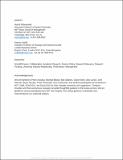Explaining Heterogeneity in the Organization of Scientific Work
Author(s)
Rahmandad, Hazhir; Vakili, Keyvan
DownloadAccepted version (1.133Mb)
Open Access Policy
Open Access Policy
Creative Commons Attribution-Noncommercial-Share Alike
Terms of use
Metadata
Show full item recordAbstract
© 2019 INFORMS. Prior studies of academic science have largely focused on researchers in life sciences or engineering. However, while academic researchers often work under similar institutions, norms, and incentives, they vary greatly in how they organize their research efforts across different scientific domains. This heterogeneity, in turn, has important implications for innovation policy, the relationship between industry and academia, the scientific labor market, and the perceived deficit in the relevance of social sciences and humanities research. To understand this heterogeneity, we model scientists as publication-maximizing agents, identifying two distinct organizational patterns that are optimal under different parameters. When the net productivity of research staff (e.g., PhD students and postdocs) is positive, the funded research model with an entrepreneurial scientist and a large team dominates. When the costs of research staff exceed their productivity benefits, the hands-on research approach is optimal. The model implies significant heterogeneity across the two modes of organizing in research funding, supply of scientific workforce, team size, publication output, and stratification patterns over time. Exploratory empirical analysis finds consistent patterns of time allocation and publication in a prior survey of faculty in U.S. universities. Using data from an original survey, we also find causal effects consistent with the model's prediction on how negative shocks to research staff-due to visa or health problems, for example-differentially impact research output under the two modes of organization.
Date issued
2019Department
Sloan School of ManagementJournal
Organization Science
Publisher
Institute for Operations Research and the Management Sciences (INFORMS)